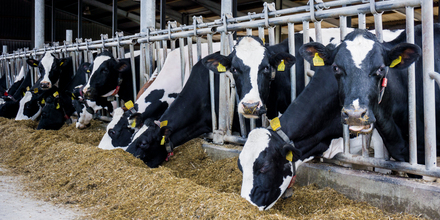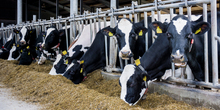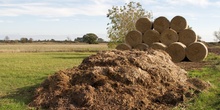Agriculture & Land Management
Our Work
Latest in Bioenergy
-

What contributions can agricultural emissions make to the proposed Effort Sharing Regulation?
New IEEP report finds the agriculture sector can significantly contribute to the EU’s climate commitments by reducing its non-CO2 emissions. It also finds these contributions can be delivered cost efficiently with environmental co-benefits without impacting production.
-
Ensuring the carbon sustainability of biomass
Ensuring the carbon sustainability of bioenergy requires a new approach in EU policy. This IEEP report spells out a different pathway to the one proposed by the European Commission in the recently released “winter package”.
-
Moving the debate on sustainable bioenergy to 2030
On 30th November, the European Commission published a “Winter package” of policy proposals, including for bioenergy in the form of a revised Renewable Energy Directive. Although encouraging to answer the many requests for policy certainty, a number of key questions about the right and most appropriate approach to deliver sustainable bioenergy still remain and need further scrutiny.
-
Biofrontiers – sustainability critical to the development of advanced biofuels
Adherence to effective and workable sustainability criteria is an essential requirement when using public support to incentivise advanced alternative fuels.
-
Understanding the consequences of changing biomass demand for energy
Understanding the consequences of increased biomass demand for energy on the environment is central to the development of future policy on renewable energy in Europe. This study seeks to help answer this need by modelling different levels of biomass demand for energy and the consequences for land use and forest based industries.
-
The cascading use of woody biomass in the EU – challenges, opportunities and policy solutions
Improving the resource efficient use of wood through cascading the resource from one use to another, requires action throughout the wood flow. Current efforts focus on recovering and re-using waste wood but more could be done with the production and utilisation of wood processing residues and improving the balancing between the material and energy use of wood.
-
IEEP sets out new sustainability criteria for biofuels post 2020
Defining effective and workable sustainability criteria for biofuels is one of the critical steps in decarbonising Europe’s energy sector. Such criteria must provide the necessary safeguards for the use of bioresources in Europe, as well as the policy and investment certainty required for sustainable deployment.
-
Sustainability criteria for biofuels post 2020
Defining effective and workable sustainability criteria is one of the critical steps in decarbonising Europe’s energy sector. They must provide the necessary safeguards for the use of bioresources in Europe, as well as the policy and investment certainty required for sustainable deployment.
-
Mapping study on the cascading use of wood products
Promoting the cascading use of wood through policy is one approach to improve resource efficiency and increase the overall availability of wood for use in a variety of sectors.
-
Land suitability assessments for bioenergy feedstocks in the EU – a review of data sources
Current data availability is inadequate to undertake a detailed national or European level study of land areas that are underutilised and could be considered available for bioenergy production within the EU.
-
New report launch: Call for a new vision for responsible renewable energy with a clear European dimension
Claude Turmes MEP hosted an event launching both IEEP’s report and a debate on the future of renewable energy in Europe. In the our report IEEP present how a resource efficient energy system might be delivered in a way that minimises impact on biodiversity and the wider environment.
-
Assessing sustainable biomass availability
Dr. Ben Allen presented IEEP’s views on the sustainable use of biomass at an international conference in Brussels. Understanding the scale of the resource is a key part of determining appropriate policy intervention and ensuring commercial viability.
-
New report: delivering low carbon transport fuels post 2020
How should EU policy support the transition to low carbon transport fuels post 2020? A new IEEP led report argues that future policies should be differentiated to tailor support towards specific objectives and technologies that offer the greatest potential for a low carbon future.
-
New report is out: delivering low carbon transport fuels post 2020
How should EU policy support the transition to low carbon transport fuels post 2020? A new IEEP led report argues that future policies should be differentiated to tailor support towards specific objectives and technologies that offer the greatest potential for a low carbon future.
-
How to stimulate a bio-economy based on waste? – A study for the UK Government
Waste resources have the potential to provide a core component of developing bio-economies across the globe. A new IEEP report reviews how waste has been incorporated into existing bio-economy strategies, and the conditions that have enabled this.
-
Conclusion on ILUC in sight
After five years of discussion, a landmark moment has been reached whereby the indirect land use change (ILUC) impacts of biofuels almost certainly will be addressed in EU law.
-
Building a high value bioeconomy in the UK: opportunities from waste
The UK is exploring opportunities to develop a high value bioeconomy based initially on waste. IEEP is helping to identify international best practice examples in order to maximise the environmental and economic benefits of this new Government initiative.
-
Space for energy crops – An assessment on the potential contribution of Europe’s energy future
The overall energy potential that can be produced from growing dedicated energy crops on ‘spare’ land in the EU is low. This new report explores the potential for the additional production of energy crops in Europe on land not already used for food production, forestry, or providing other important services, and assesses some of the challenges associated with increasing output.
-
Press release - Biofuels don’t deliver but bioresources have promise
Biofuels produced from conventional agricultural crops deliver only limited reductions in greenhouse gas emissions (GHG) and compete for limited supplies of land.
-
Waste-based biofuels sector needs smarter EU 2030 package to realize its high potential
A robust sustainability framework and ambitious decarbonisation targets for transport fuels in 2030 are necessary to ensure efficient waste utilisation and the long-term reduction of transport emissions.
Related
-

Developing a sustainable future for biofuels
Disseminating knowledge and informing the debate around the future of biofuel policy in the EU.
Highlights
-

What contributions can agricultural emissions make to the proposed Effort Sharing Regulation?
New IEEP report finds the agriculture sector can significantly contribute to the EU’s climate commitments by reducing its non-CO2 emissions. It also finds these contributions can be delivered cost efficiently with environmental co-benefits without impacting production.
-

Ensuring the carbon sustainability of biomass
Ensuring the carbon sustainability of bioenergy requires a new approach in EU policy. This IEEP report spells out a different pathway to the one proposed by the European Commission in the recently released “winter package”.
-

Understanding the consequences of changing biomass demand for energy
-

The cascading use of woody biomass in the EU – challenges, opportunities and policy solutions
-

Sustainability criteria for biofuels post 2020
-

Land suitability assessments for bioenergy feedstocks in the EU – a review of data sources
-

New report: delivering low carbon transport fuels post 2020
-

How to stimulate a bio-economy based on waste? – A study for the UK Government
-

Biofuels and Agricultural Commodity Prices: A Review of the Evidence Base
-

Mobilising Cereal Straw in the EU to Feed Advanced Biofuel Production
